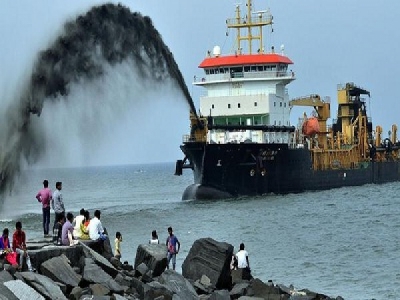
Posted on November 9, 2017
By P Manoj, The Hindu
The outcome of the recent winning bids shows that DCI had been taking advantage of the port trusts by taking up work on nomination basis at rates that were much higher than the market, said a major port trust official
Central government-owned major ports trusts will not be affected by the decision to privatise Dredging Corporation of India (DCI) because they are hiring dredging contractors to deepen or maintain their channels and berths through open competitive bids.
Barring Kolkata Port Trust, all the port trusts were advised by the Shipping Ministry in April 2007 to finalise their dredging contracts through auctions.
Nomination basis
Till then, port trusts had been awarding contracts to DCI on a so-called nomination basis (without tender) at rates negotiated between the two sides.
In 2015, the Shipping Ministry unveiled a new dredging policy mandating all major port trusts to opt for open competitive bids for capital/maintenance dredging works.
Kolkata Port Trust continued with the nomination system to engage DCI till 2016, when it decided to finalise the dredging contractor through a tender.
Cochin Port Trust finalised dredging contracts between 2007 and 2010 through auctions. But, from 2011 to 2016, it reverted to the nomination system and awarded the contract to DCI. “Kolkata and Cochin were two convenient projects for DCI; in fact, the Kolkata contract accounted for more than half the annual revenue of DCI,” said a dredging industry consultant.
The end of the nomination system forced DCI to become price competitive while bidding for contracts. And, its participation in tenders acted as a tempering influence on private rivals — both local and international — fetching lower rates for port trusts, irrespective of whether DCI emerged the successful bidder or not.
“Otherwise, how will DCI improve if it doesn’t learn to compete and bring efficiency into its system. It is public money going from one government entity to another,” the consultant said.
DCI under-cut its private rivals to take up a three-year maintenance dredging contract at Mumbai Port Trust beginning October 2017 by quoting ?83.99 crore against an estimate of ?141 crore. Van Oord Dredging and Marine Contracting Co — the second lowest bidder — quoted ?118 crore.
Van Oord won a three-year maintenance dredging contract at Deendayal Port Trust (earlier known as Kandla Port Trust) by putting a price bid of ?337 crore against an estimate of ?514 crore. DCI was the third-lowest bidder with a quote of ?420 crore.
DCI was the lone bidder for a five-year maintenance dredging contract at the Haldia dock of Kolkata Port Trust. The other bidder, Mercator, was disqualified because it had submitted some deviations to the tender.
The rate of ?1,119 crore quoted by DCI was approved by the port trust and the ministry.
For its last dredging contract with Kolkata Port Trust on nomination basis, DCI was charging about ?40 lakh per dredger, translating into about ?1.2 crore per day. “The tender resulted in DCI lowering its rate by as much as ?50 lakh per day and we had no problems in approving it,” a ministry official said. The Kolkata contract started in January this year.
Cochin Port Trust, meanwhile, has floated a tender to finalise an annual maintenance dredging work estimated at ?123 crore after the ministry ignored a request from the port trust to continue with DCI on nomination basis. Both DCI and Mercator have applied on the tender.
DCI also lobbied the Shipping Ministry to let it continue working at Cochin on nomination basis, assuring the ministry it is willing to give a discount of as much as 15 per cent on the existing rate.
A major port trust official said the privatisation of DCI could pave the way for private companies to form cartels and raise prices. At the same time, he said post-privatisation, competition will continue among private firms because it is a question of their survival.
“The outcome of the recent winning bids shows that DCI had been taking advantage of the port trusts by taking up work on nomination basis at rates that were much higher than the market,” he said.
Source: THE HINDU





